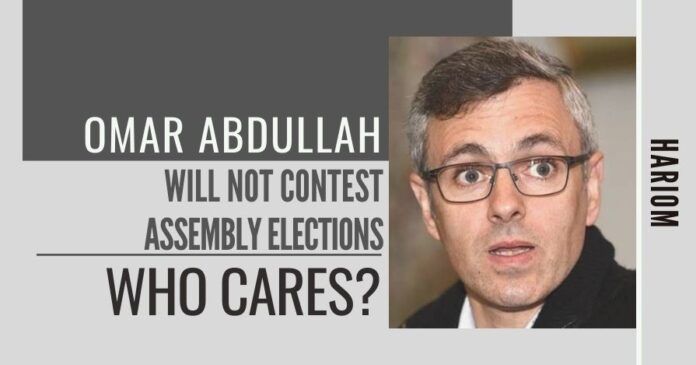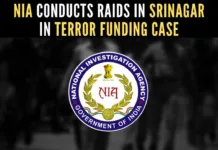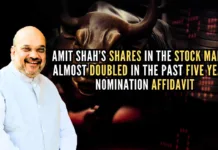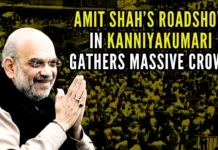
Omar Abdullah didn’t appreciate the PM and the Governor. He criticized them.
National Conference (NC) vice president and former J&K CM Omar Abdullah finally penned down his views on the political status of the erstwhile State of J&K vis-à-vis New Delhi, powers the state exercised for 70 long years, virtual abrogation of Article 370, complete abrogation of Article 35A, division of J&K State into two UTs – UT of J&K and UT of Ladakh – on August 5, 2019, and political conduct of PM Narendra Modi and J&K Governor (SP Malik). These plus his many fulminations appeared on July 26 in Indian Express under the caption “Omar Abdullah writes: While J&K remains UT, will not contest Assembly elections”.
The former CM started with the observation: “Changes of August 5, 2019, were tectonic and these were forced on the people of J&K” much to their chagrin and against their wishes. Indeed, the changes were revolutionary, epoch-making, and people-centric, but against those who ruled or misruled the state for 71 years, converted it into their personal fiefdom and denied the people the rights they deserved.
Even the Congress lawmakers helped the government by violating the party Whip. The story of their attitude to the motion seeking division of J&K into two UTs was no different.
I will ignore what I consider unworthy of any consideration or irrelevant and reflect on the main issues out-on-the-limb Omar Abdullah raked. He said: “The Parliament of India spent less than a day each in the Lok Sabha and the Rajya Sabha to change more than 70 years of history, to undo the sovereign commitments made to the people of J&K and to dismember the state”.
Omar Abdullah suppressed three facts. One, there was hardly any discussion on Article 370 in the Indian Constituent Assembly on October 17, 1949, and no discussion at all on Article 35A in the Constituent Assembly. Article 370 was adopted in no time as a “Temporary” Article overlooking Maulana Hasarat Mohani’s warning: The grant of special status to Kashmir (on the score of religion) will enable it to “assume independence afterward”.
As for Article 35A of May 14, 1954, it was applied to J&K w.e.f. May 14, 1944, by JL Nehru bypassing the Parliament. It was unconstitutional, illegal and fraud committed on the nation, on the Parliament and the Constitution itself. It was applied when India was still under London and J&K still a Princely State. There was a report that Article 35A was applied to J&K as per the agreement reached between Nehru and Pakistan.
Credit goes to skillful and effective leadership of PM Narendra Modi and HM Amit Shah whose stand on Article 370 and 35A and J&K State was appreciated even by many Opposition lawmakers in the Rajya Sabha where the BJP/NDA was in a minority. They stood solidly behind the government. Even the Congress lawmakers helped the government by violating the party Whip. The story of their attitude to the motion seeking division of J&K into two UTs was no different.
Rather had to make this statement when this writer, who was there participating in the event, challenged them to “give me a copy of the signed Delhi Agreement and I will change my opinion”.
Hence, to say that Lok Sabha and Rajya Sabha didn’t discuss in detail the government’s motions would be only an exercise in self-deception. But more than that, the BJP only did what it had solemnly promised in its election manifesto. Had the BJP not abrogated Articles 370 and 35A, it would have been regarded as a sinner and murderer of the people’s faith. The PM and the HM created history in the manner history is created. Omar Abdullah has to review his stand on manifesto politics. He has to explain why the parties make public their poll manifestos on the eve of elections or during the election campaign.
Third, Omar Abdullah talked about “sovereign commitments”. Which sovereign commitments? Who made these so-called commitments? Where is the document that contains these commitments? An instrument of Accession? The Instrument of Accession signed by the Maharaja of J&K was no different from the one signed by the other 560-odd Princely States. It’s a fact. Can Omar Abdullah or any other Kashmiri leader pinpoint the difference/differences, if any, between the Instrument of Accession signed by the J&K Maharaja and the one signed by other Princes? No, they can’t.
The non-existent Delhi Agreement of 1952? Talks between JL Nehru and his grandfather, Sheikh Abdullah, in 1952 had no legal or constitutional sanctity. These talks were held over the heads of Jammu and Ladakh and other nationalists in the State, including the Kashmiri Hindus. They had not given Nehru-Sheikh the mandate to shape and mold their future and destiny and the state’s political status and its destiny. In fact, the people of Jammu under the leadership of Pt Prem Nath Dogra and Dr. Shyama Prasad Mookerjee and the people of Ladakh under the leadership of Head Lama of Ladakh Koshuk Bakula were fighting relentlessly against what Nehru and Sheikh had been doing. The very fact that Sheikh had to be dethroned and arrested on August 9, 1953, should clear all the cobwebs of confusion and set the record straight.
It needs to be noted that there exists no such Agreement as the Delhi Agreement of 1952. Finance Minister AR Rather in the presence of all the NC ministers, including CM Farooq Abdullah, all the lawmakers, and others had at Sher-i-Kashmir International Convention Centre (SKICC) admitted that there “existed no signed Agreement between Nehru and Sheikh” and that “it was a mere statement”. Rather had to make this statement when this writer, who was there participating in the event, challenged them to “give me a copy of the signed Delhi Agreement and I will change my opinion”. The then-junior minister Ajay Sadhotra and Director Information, KB Jandial, were also very much there to endorse what this writer claim.
Similarly the view of Omar Abdullah that “the nominated representative of the Union government (Governor) usurped powers, that should have been vested with the legislature and a popularly elected government, to rewrite J&K’s constitutional relationship with the rest of India”, is as flawed as it is politically motivated, ill-conceived and ill-designed.
J&K was not a foreign country; it was integral to India socially, culturally, civilizational, and politically since times immemorial. The Indian Parliament is the supreme law-making body and it exercised its authority to undo the past wrongs. Wrongs that had only promoted communalism, separatism, Pakistani cause, rid Kashmir of all minorities, and eroded the distinct identities of Jammu and Ladakh. Wrongs which had created an impression the world over that J&K was a disputed territory whose political future was yet to be determined.
Omar Abdullah didn’t appreciate the PM and the Governor. In fact, he criticized them. Reasons are obvious and the most important reason was: He and others of his ilk wanted the PM and the Governor to tell them as to what was in the offing but that didn’t happen. Omar Abdullah needs to remember that history is not created this way. The administration is not run this way.
What did he say about the PM and the Governor? He said: “The people were treated to categorical denials by the occupant of the highest office in the state, the Governor, that J&K’s special status faced no threat. He debunked the rumors, explained away the additional forces suggesting they were required for Assembly elections later in the year. So what does one conclude from this? That the occupant of such a high office deliberately lied to the people or that he wasn’t kept informed?… Some of us, senior office-bearers of the J&K National Conference, had a meeting with the PM just days before the August 5 developments. It’s not a meeting I will forget in a hurry. One day I may write about it but propriety precludes me from saying more than that we left the meeting with a completely different impression about what was going to unfold in the next 72 hours”.
Article 35A was a black law ever enacted to deny the right to life to millions in J&K and a law that created hatred for all the Indians.
What Omar Abdullah said must make the nation appreciate both the PM and the Governor. They acted in the manner the genuine and committed history-makers act and conduct. Had the PM and the Governor hinted at what was on the agenda of the Union Government, the vested interests in Kashmir could have played mischief. Omar Abdullah himself remained at the hem of affairs in the state for 6 years and he should know how things could be handled and managed and how agendas are implemented.
Omar Abdullah asserts that Article 35A defined “who a bonafide resident of J&K was”. No sane person will buy his argument. Article 35A didn’t define citizenship; it actually denied full citizenship even to J&K daughters married outside the state to the non-“Permanent Residents” of the state and denied citizenship to the Jammu-based Hindu-Sikh refugees from Pakistan, Valmiki Samaj, Gorkhas, and Marathas to make their life a veritable hell on earth and declared all the non-J&K resident’s persona non-grata in the state. So much so, 35A considered even President and Prime Minister of India aliens. Indeed, Article 35A was a black law ever enacted to deny the right to life to millions in J&K and a law that created hatred for all the Indians. Indeed, Article 35A provided for double citizenship for a minuscule section of Indian population: Full citizenship rights in J&K and full citizen rights in the rest of the country. Indeed, Article 35A stood one-way traffic. It had to go and it went following a legislative route.
Omar Abdullah bemoans: “What came as a shock was the humiliation heaped on the state by downgrading it and splitting it into two Union Territories…To this day, I fail to understand the need for this move, except to punish and humiliate the people of the state”.
The Kashmiri leadership is responsible for the conversion of J&K into UT and the separation of Ladakh from J&K. They had misused and exploited to the hilt Civil Secretariat; Home, Revenue, Law, Finance, Forest, Urban and Housing Departments; and the office of the Advocate General to hurt the nation and jeopardize even the general civil, political, economic and social-cultural rights of the people of Jammu and Ladakh. UT had to be created to defeat their ultimate goal. It’s a different matter that Jammu again suffered because of the sins of those who played shots after 1947. Ladakh was lucky that it got political emancipation from Kashmir. Like Jammu, Ladakh had suffered during all these 72 years. They had divided Ladakh in 1948 to create a communal counterpoise in Kargil to the aspirations of the Buddhists. They had created Doda district in 1978 out of Hindu-majority Udhampur district to weaken the movement in Jammu for the empowerment of the people of the province and help the votaries of “Greater Kashmir”. It’s a matter of great satisfaction that the Narendra Modi Government separated Ladakh from J&K and snatched the full state status from the leftover J&K. It is hoped that it would give statehood status to Jammu and maintain Kashmir as a UT in the larger national interest taking into account the kind of role the Kashmiri leadership played before and after 1947.
Omar Abdullah says that “even the Supreme Court, as recently as 2018, has held that Article 370 had acquired a permanent status by virtue of its years of existence making its abrogation impossible”. True. But it’s also true that the same SC had also ruled that “J&K Constitution is subservient to the Indian Constitution” and that “J&K is not a sovereign entity”. So, the Indian Parliament only used its sovereign power to render Article 370, which had become a threat to national security and Indian sovereignty. Things have changed. The selective approach will not work.
Omar Abdullah says that “the special constitutional status enjoyed by J&K was not a favour done to the state” and that “it formed the basis of the state’s accession to India”. Why special status? Just because the Hindus/Sikhs/Buddhists were not a majority in the state. It’s not done. Secularism doesn’t mean separate status for certain community or communities. The Preamble of the Indian Constitution is clear on this subject. It’s a different matter that those responsible for upholding the Indian Constitution and its Preamble failed the nation and allowed a section of Indian society to enjoy a separate status. Why the way, has Omar Abdullah the moral right to talk secularism given the fact that his own NC joined hands with Congress, PDP, CPIM, and PDF in 2007 to reject outright the Private Member’s Bill seeking incorporation of the word secularism in the Preamble of the J&K Constitution? Constitution which was framed by a 100% rigged and 100% NC constituent Assembly (1951-1956).
The operative part of Omar Abdullah reads: “As for me, I am very clear that while J&K remains a Union Territory I will not be contesting any Assembly elections. Having been a member of the most empowered Assembly in the land and that, too, as the leader of that Assembly for six years, I simply cannot and will not be a member of a House that has been disempowered the way ours has”. What can one say about his decision? He is his own master. To contest or to not contest an election is his choice. However, if what he said was his pressure tactic, then he needs to remember that what was done by the Narendra Modi Government on August 5 and 6, 2019 is going to be maintained, preserved, and further consolidated.
Omar Abdullah and others of his ilk would do well to remember that Jammu is a powerful political factor in the state’s political situation and that the nation wanted what the Narendra Modi Government did. Omar Abdullah himself said: “Removing J&K’s special status may have been the popular thing to do”. It is a different story that he coupled it with an untenable observation: “Going back on a nation’s sovereign commitment is never going to be the right thing to do”. It’s quite understandable. It’s a manifestation of frustration.
Note:
1. The views expressed here are those of the author and do not necessarily represent or reflect the views of PGurus.
- ‘Kashmir My core constituency’: Revisiting July 12, 2003 to understand politics, Omar Abdullah-style - March 15, 2024
- Total deviation from traditional approach: Seven takeaways from PM Modi’s March 7 Srinagar visit - March 9, 2024
- Status of political parties: Why is further J&K reorganization imperative? - March 1, 2024











Indeed, who the F cares?
Just disappear, OA, J&K will be a better place w/o you & your dynasty.
let the likes of abdullas, muftis and azads be consigned to the dustbin of history at the earliest. period
Mr. Hari Om My salute to you. The references to the past and the way you brought out the truth is eye-opening. The way things were done unilaterally by Jawaharlal Nehru abusing the enormous trust of Mahatma Gandhi, Sardar Patel and most importantly the gullible public is unpardonable. Even if we take back the Bharat Ratna from him, there is nothing wrong. It is most appropriate. In a true democracy, the head of the Government (Prime Minister in our country) must be a man of character. Of course everyone in politics must be people of immense character, honesty and integrity, the people will automatically accept them to be true leader.
सत्यं वद , धर्मं चर